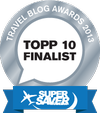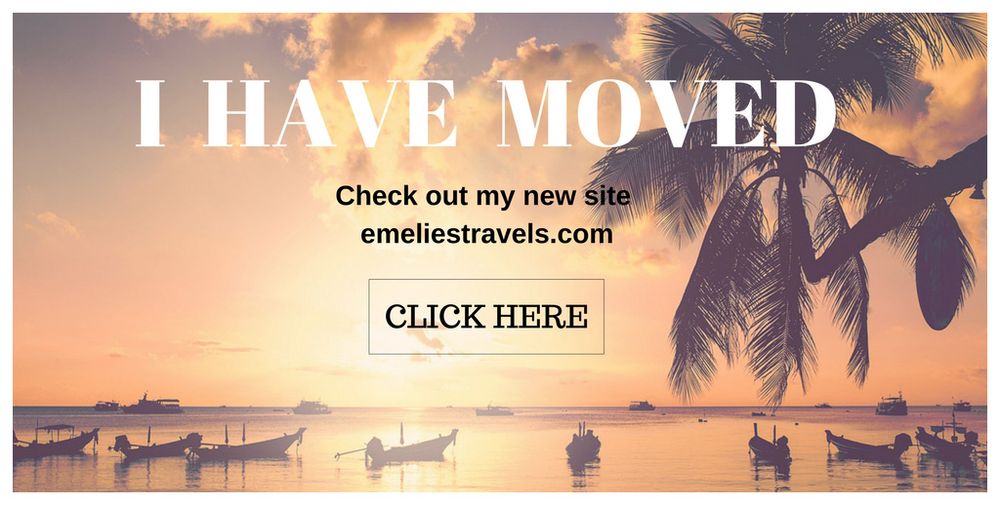Time to abandon Ave Maria2014-12-25 22:41:41
Vi körde in i ett par stora stockar den natten, som smällde till fören precis under där jag skulle försöka sova. Jag bara väntade på att vi skulle köra in i en container som något fartyg tappat. Vi körde aldrig in i någon container, men däremot small motorn till igen. Det var ingen som vågade höra sig för om vad som försegick, så vi sov vidare. Jag vaknade av att ankaret kastades ut, så jag hoppade upp ur bingen för att se var vi var. Det var fortfarande bäcksvart, det hade inte gått mer än två timmar.
Vi var tillbaka i samma vik.
Växellådan hade gått sönder den här gången, så Paul bestämde att det var säkrast att åka tillbaka till samma plats. Det var hopplöst, Paul skulle aldrig lyckas laga motorn utan hjälp. Hur säkert det nu var att övernatta i viken där Kuna folket ville bli av med en fortast möjligt är en bra fråga. Vi blev i alla fall inte kapade den natten, Kuna folket lämnade oss ifred.
Nästa dag, vaknade alla tidigt och funderade på vad som skulle hända härnäst. Paul och Sindry tog sovmorgon medans alla vi andra var stressade för att vi var inne på dag fyra av fem och vi hade fortfarande inte nått fram till San Blas. Tillslut berättar han att vi alla skulle försöka hitta ett annat transportsätt. Efter att Sindry kokat Paul ett antal koppar kaffe kunde hon äntligen följa med oss till byn för att hjälpa till att prata med byborna. Återigen fick vi inte använda motorn, och den här gången låg vi ankrade mycket längre ut så det tog en evighet att nå land.
Att ta oss ifrån Carreto via landvägen var det inte frågan om, för det var farligt. Dessutom hade Paul stämplat ut våra pass åt oss i Cartagena i Colombia, och vi var laglösa ute på havet ända till vi skulle nå en immigrationsö där han skulle stämpla in oss. Enligt ett dokument var vi passagerare på Ave Maria och var därför tvugna att bli instämplade från havet, inte vid någon landkontroll. Paul tyckte att vi skulle försöka ta oss till Puerto Obaldia, en flygplats som inte var så långt bort för att bli instämplade där och flyga därifrån. Hur gärna vi än ville lämna Ave Maria, så var vi tveksamma på det alternativet. Vem skulle betala för flygbiljetterna? Sindry pratade med Kuna-folket men det verkade inte finnas några tillgängliga båtar till varken flygplatsen eller den immigrationsön som vi enligt plan A skulle åka till. Det enda hoppet vi hade var en liten mobiltelefon som en Kuna-kvinna hade tejpat fast på en bambuvägg. Det var den enda platsen i hela byn med mottagning, men bara på just den telefonen. Vi hade inte kunnat kontakta någon tidigare, ingen visste var vi var eller vad som hade hänt. När vi nämde för Sindry att vi skulle försöka kontakta företaget, Blue Sailing, som vi köpt resan av, blev hon upprörd och hoppade i en kanot och bad en lokal att ro ut henne till Ave Maria. Hon tyckte att det var viktigare att laga lunch ifall att vi började bli hungriga istället för att lösa problemet.
Vi kom tillslut fram till Blue Sailing och en kvinna som heter Laurel. Megan bad om hjälp med skärrad röst och berättade allt vi varit med om. Laurel ville hjälpa oss, hon behövde bara ett bekräftande samtal från Paul. Vi var glada att ha fått prata med någon annan utanför Ave Maria, men bekymrade över hur vi skulle berätta för Paul att vi involverat Laurel eller hur vi ens skulle få han att ta sig i land för att ringa till henne. Vi var oroliga för att han skulle bli hotfull och aggressiv. Han ville ju inte förstöra sitt rykte för det skulle såklart gå emot hans business.
Vi gaddade ihop oss för att våga berätta om Laurel för Paul, rodde tillbaka och möttes av en speedboat som låg intill Ave Maria. Tydligen hade Sindry lyckats organisera en båt under tiden vi ringde till Laurel. Speedboat föraren förklarade att det inte alls var en bra idé att åka till flygplatsen, där väntade en massa kubaner på att få lämna landet och det kunde ta veckor innan man kunde få plats på ett flyg. Desstuom var det väldigt farligt, och det låg på gränsen till Colombia. Det var först då vi förstod hur nära gränsen vi var – vi hade alltså knappt kommit någonstans. Det hade tagit oss 65 timmar att segla en sträcka som hade tagit lite mer än 10 timmar med buss. Speedboat-kaptenen tyckte istället att vi skulle åka till immigartionsön, El Povenir. Det var även det alternativet som Laurel gett oss, men hennes båt skulle gå nästa morgon. Nu hade vi en båt precis framför oss, problemet var bara pengar. Laurel skulle anordna allt åt oss, vi skulle inte behöva betala någonting. Men Paul var inte glad av att höra att vi dragit in Laurel i sörjan. Trevor började ifrågasätta Paul och hans olika såkallade plan B, C och D.
- I can hear that your tone has turned more aggressive since you’ve spoke to Laurel. If you don’t turn that tone down I’ll fucking slam you Trevor! hotade Paul.
Som vi trodde blev Paul väldigt aggressiv, han var stressad, arg och frustrerad. Vi skulle komma överens om vi ville ta Sindrys alternativ och åka med det samma, eller vänta på Laurels alternativ nästa morgon.
- You don’t want to spend another 24 hours here, do you!? fortsatte Paul med en hånfull stämma. After Thursday you are not my problem anymore. You are backpackers, not tourists, you can work this out, fortsatte han.
Vi kände oss så gott som tvungna att lämna Ave Maria och vi ville heller inte stanna där, även om vi fortfarande hade en natt kvar som vi betalat för och måltider kvar att äta. Vi hade inte tillräckligt med pengar till att betala speedboat kaptenen. Ingenstans på öarna skulle det finnas bankomater, och många av oss hade bara några få dollar på oss. När vi alla skrapat ihop allt vi hade i dollar och Colombiska pesos, hade vi en total på $450. Båten skulle kosta oss $700 så det fattades fortfarande en hel del pengar. Efter många försök till att pruta ned priset från Paul och Sindrys sida, hade Paul inget annat alternativ än att ge oss de restrerande pengarna. Han gav oss 400 000 Colombiska pesos, vilket motsvarar $160. Vi var fortfarande $90 dollar kort. Speedbåt chauffören sa åt Sindry att vi inte skulle ha möjlighet att åka direkt till El Povenir den kvällen, det skulle bli mörkt och farligt att åka så han tyckte att det var bättre om vi väntade till nästa morgon. Men det örat ville de inte lyssna på och trots att vi fortfarande inte hade tillräckligt med pengar för båten, skickade de iväg oss.
English version
We sailed over a couple of large logs that night, which slammed into the bow just below where I would try to sleep. I was just waiting for us to run into a container that some vessel had left behind. We smashed any container, but the engine smacked again. No one dared to find out about what was happening, so we slept on. I woke up when the anchor was thrown out, so I jumped out of the cabin to see where we were. It was still pitch black, it had not been more than two hours.
We were back in the same bay.
The gearbox had broken this time, so Paul decided to go back to the same spot. It was hopeless, Paul would never manage to fix the engine without help. How safe it was to spend the night in the bay where the Kuna-people wanted to get rid of us as soon as possible is a good question. We were however never robbed, the Kuna people left us alone. The next day, everyone woke up early and wondered what would happen next. Paul and Sindry slept in while the rest of us were stressed because we were already at day four of five and we still had not reached the San Blas. Eventually he told us that we should all try to find another type of transport. After Sindry made Paul a number of cups of coffee, she could finally go with us to the village to help to talk to the villagers. Again, we did not use the engine, and this time we lay anchored much further out so it took forever to reach the shore.
We could not leave Carreto by land, that was too dangerous. Besides, Paul had stamped our passports in Cartagena in Colombia, and we were outlaws at sea until we would reach an immigrationisland where he would stamp us in. According to a document we were passengers on the Ave Maria and therefore had to be stamped from the sea, not by any country control. Paul thought that we should try to go through Puerto Obaldía, an airport that was not very far away to be stamped in there and then fly from there. We really wanted to leave Ave Maria, but we didn't like that option. Who would pay for the airline tickets? Sindry talked to the Kuna-people, but it didn't seemed to be any available boats for either the airport or the immigrationisland. The only hope we had was a small cell phone as a Kuna-woman had taped on a bamboo wall. It was the only place in the whole village with reception, but only on that particular phone. We had not been able to contact anyone before, no one knew where we were or what had happened. When we named for Sindry that we would try to contact the company we've made the booking thorugh, she became upset and jumped into a canoe and asked a local to row her out to Ave Maria. She thought it was more important to cook lunch if we started getting hungry instead of solving the problem.
We finally got through to the company and a woman named Laurel. Megan asked for help with a jumpy voice and told her everything we had been through. Laurel wanted to help us, she just needed a confirmation call from Paul. We were pleased to have been talking to someone else outside the Ave Maria, but worried how we would tell Paul that we involved Laurel, or how we would even get him to go ashore to call her. We were worried that he would be hostile and aggressive. He did not want to ruin his reputation because it would obviously go against his business.
We went together to dare to tell Paul about Laurel, rowed back and was greeted by a speedboat that was next to Ave Maria. Apparently Sindry managed to organize a boat during the time we called Laurel. The speedboat driver explained that it was not a good idea to go to the airport. There were a lot of Cubans who wanted to leave the country and it could take weeks before an available seat. Besides it was very dangerous, and it was on the border to Colombia in the Darién Gap. Just then we realized how close to the border we were - we had barely moved somewhere. It had taken us 65 hours to sail a distance that had taken a bit more than 10 hours by bus. The speedboat-captain instead sugested us to go to the immigartionisland, El Povenir. We also had the option that Laurel gave us, but her boat would leave the next morning. Now we had a boat right in front of us, the problem was just money. Laurel would organize everything for us, we would not have to pay for anything. But Paul was not happy to hear that we brought Laurel into all of this. Trevor began to question Paul and his various so-called plan B, C and D.
- I can hear that your tone has turned more aggressive since you've spoke to Laurel. If you do not turn that tone down I'll fucking slam you Trevor! threatened Paul.
As we thought Paul got very aggressive, he was stressed, angry and frustrated. We voted if we wanted to take Sindrys options and go just then, or wait for Laurels options next morning.
- You do not want to spend another 24 hours here, do you!? Paul continued with a sneering voice. After Thursday you are not my problem anymore. You are backpackers, not tourists, you can work this out, he continued.
We felt forced to leave Ave Maria and we did not want to stay there, even though we still had one night as we had paid for and meals left to eat. We did not have enough money to pay the speedboat captain. Nowhere on the islands had ATMs, and many of us had only a few dollars on us. As we collected all the money that we had, dollars and Colombian pesos, we had a total of $450. The boat would cost us $700 so we still needed a lot of money. After many attempts to haggle the price down by Paul and Sindrys, Paul had no other alternative but to give us the rest of the money. He gave us 400,000 Colombian pesos, which equals $160. We were still $90 short. The speedboat driver told Sindry that we would not be able to go directly to El Povenir that evening, it was a long journey so it would be dark and dangerous before arriving. He thought it was better if we waited til the next morning. But this they did not want to listen to and even though we still didn't have enough money for paying the boat, they sent us away.

So happy to finally leave Ave Maria
Så fort vi kommit iväg en bit förklarade speedboat-kaptenen för oss att vi bara kunde åka halvvägs den kvällen. Vi skulle vara tvugna att övernatta på en annan ö. Vi förklarade att vi inte hade pengar att betala för boende, de enda pengarna vi hade var hans och då skulle vi vara tvugna att betala med dem. Men den här kaptenen visste vad han pratade om, och det var inte frågan om att vi skulle åka när det var mörkt. Han körde oss till ön Playon Chico. Som han hade sagt var det mörkt när vi kom dit, och vi möttes av hans vänner med öppna armar. De ville gärna hjälpa oss med boende för en billig peng. För $5 var fick vi bo i tältsängar och hängmattor i en hydda. Vi bjöd dem på öl och rom och de satte igång och lagade kokosris åt oss. Vi hade verkligen inga pengar men dessa människor ville bara hjälpa oss, de är nog de vänligaste människorna jag någonsin mött.
- Mi casa es su casa, somos hermanos, sa mannen som kom med kokosris till oss. "Mitt hem är ditt hem, vi är alla bröder".
De blev allt fler och fler, hela familjen ville vara med och se vad vi var för konstiga filurer. När kamerorna åkte fram blev det fotofest. Alla ville vara med på bild. Vi somnade tidigt den kvällen, vi fick inte gå utanför hyddan för det var inte säkert för oss att vistas där. Det var också väldigt lyhört då alla hyddor är byggda av gles bambu så det var som att bo ihop med hela byn.
Vi är oerhört tacksamma för alla dessa hjälpsamma medmänniskor, och som tack för allt kommer vi skicka en massa bilder till dem och tala gott om deras by och hyddan vi bodde i. För den som planerar att besöka ön Playon Chico i Kuna Yala, San Blas, ta kontakt med Emiliano Alvila, hans familj är helt underbar!
English version
As soon as we got out of the bay, the speedboat captain explained for us that we could only go halfway that evening. We would have to spend the night at another island. We explained that we did not have any money to pay for accommodation, the only money we had was his money and in that case we would have to pay with them. But this captain knew what he was talking about, and there was not even questionable to go in the dark. He drove us to the island called Playon Chico. As he had told us it was dark when we arrived and we were greeted by his friends with open arms. They wanted to help us with accommodation for a low price, only $5 each. We got to stay in camp beds and hammocks in a hut. We invited them for beers and rum, and they began to cook us coconut rice. We really had no money but these people just wanted to help us, they are probably the friendliest people I've ever met.
- Mi casa es su casa, somos hermanos, said the man who brought us the coconut rice. "My home is your home, we are all brothers."
More people showed up, the whole family wanted to see what kind of strange fellows we were. When we ut up our cameras, a photoshoot took place. Everyone wanted to be in the pictures. We went to sleep early that night, we were not allowed to go outside the hut because it was not safe for us.
We are extremely grateful for all these helpful fellow human beings, thanks for everything, we will send a lot of pictures to them, and spread a good word about their village and the hut we stayed in. For those planning to visit the island Playon Chico in Kuna Yala, San Blas , contact Emiliano Alvila, his family is absolutely wonderful!

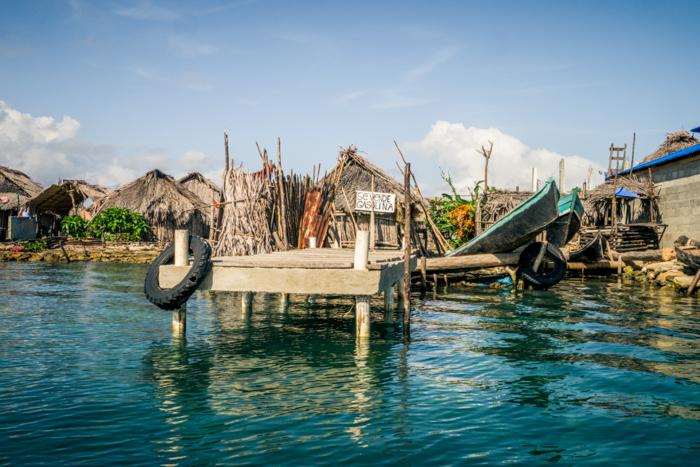


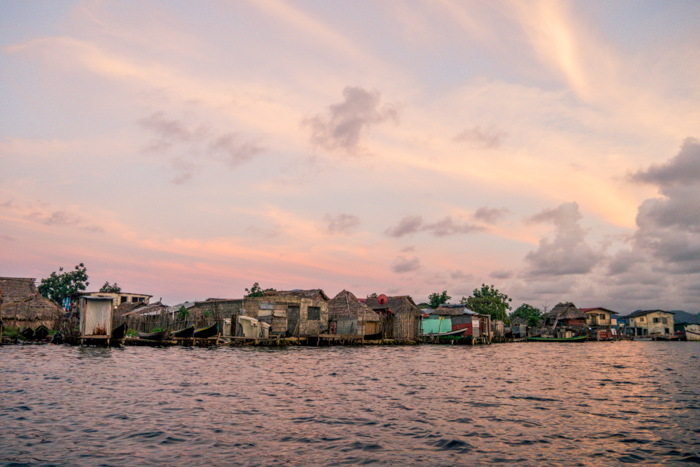
We stayed in this village

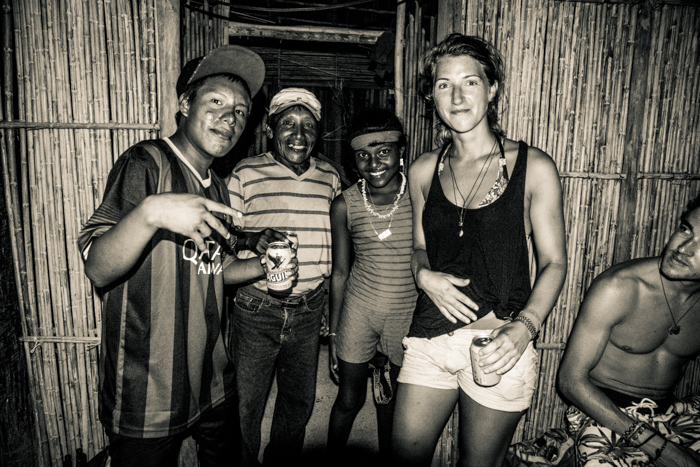
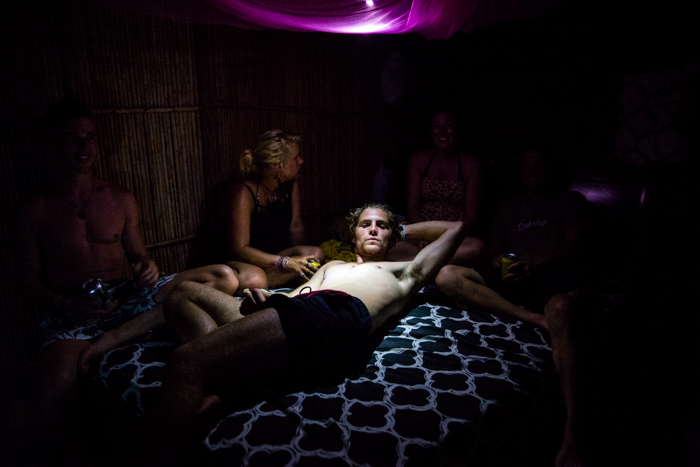
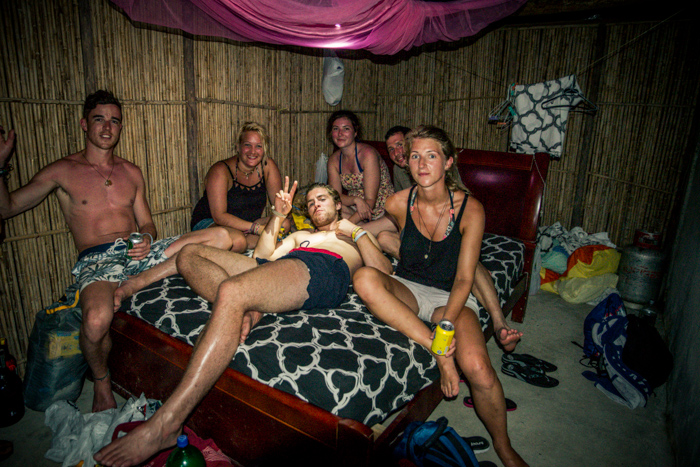

We got some wonderful coconut rice



Comments
Pappa
Vilka äventyr.
Send a letter:
Trackback




